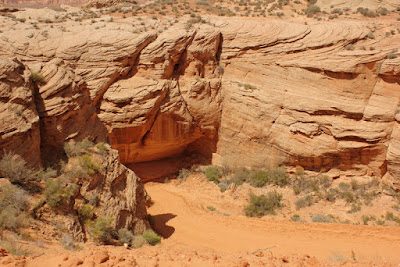
This is installment one of my 2017 Arizona/New Mexico road trip adventures with my friend Kerri.
As we bumped down the dirt road to the mouth of the canyon, tour company owner Jackie told us that Navajo culture is matriarchal, and the land we were seeing belonged to her mother. The rocky landscape was her home, the place she felt most comfortable. Just before she dropped us off, her words captured my imagination: “This is where the wind lives.”
Antelope Canyon, near Page, Arizona, is one of the most
visited slot canyons in the Southwest. (Slot canyons are narrow, deep canyons
carved by water.) Tours go to Upper and Lower Antelope Canyon, as well as a few
lesser-known canyons. We chose to visit “Canyon X,” with Taadidiin Tours (no affiliation).
After Jackie dropped us off, we descended into the canyon itself,
where we were met by a guide. The sandstone curves, swirls, and corkscrews,
carved by wind and water into sinuous shapes. Colors range from pale peach to deep purple, depending on the angle of the sun.
When the sun shines into the canyon just right, you can see the elusive trademark Antelope Canyon shaft of light. As we walked deeper between the curving walls, we saw our first one. (The guides toss fine sand into the air so it shows up in photos.)
If ever there is a place to look up, look down, look all around, it is here.
 |
| Looking up |
The guides helped us with our camera settings so we would get the best shots, and though they kept an eye on us, they allowed us to freely explore. It wasn’t mobbed with people the way the Upper
and Lower Antelope Canyon tours can be, and we were able to take our time
exploring, taking photos, and soaking up the peaceful atmosphere. I was even able to sit quietly and make a quick sketch of a section of the canyon. (The challenge will be mixing watercolor representative of the shades of rock I saw!)
A few more photos:
 |
| Canyon resident |
 |
| Looking down into the canyon entrance from where we were dropped off. |
 |
| Photo courtesy Amanda Sandlin |
This weekend I watched the movie Wild, based on
Cheryl Strayed’s book about her experiences hiking the Pacific Crest Trail
(PCT) in an effort to put her life back together following personal tragedy.
While watching, my first thought was: I couldn’t do that. I’m just not
physically and mentally tough enough to undertake a three-month, 1,000-mile hike
through the wilderness by myself.
Good thing for me, I don’t have to. Instead of feeling inadequate, I remembered I have absolutely no
desire to try grueling challenges like hiking
the PCT (and I’m also blessed not to be coping with the
amount of trauma and drama Strayed was).
My adventures don’t need to look like Cheryl Strayed’s, or
yours, or anyone else’s. Adventures don’t have to be big, scary undertakings to be
adventurous. Adventure is not one-size-fits-all. Little adventures—everyday
adventures as I call them—add immeasurable happiness to life. While bigger
adventures may be more life-changing, everyday adventures (the new class, the trip
to the beach at sunset, the visit to the farmer’s market, or watching for the
next “blood moon,” for instance) are much more accessible to most people.
Adventures, small and large, are important because they open
the mind, build confidence, and give the remembering self something to savor.
When we stop waiting for the next big adventure and start incorporating
everyday adventure into our lives, we’ll be happier for it.
Make a list of everyday adventures you want to try—and come
back here to share with us!















